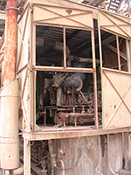 |
| A ragged line of land mines stretches across the desert. Such fields cover hundreds, maybe thousands, of acres. |
If there is any glory at all in war, this wars is spent. Whats left is cleanup.
Combats lethal leftovers litter the landscape and cluster on the perimeters of refineries, gas-oil separation plants and wellheads throughout southern Iraq. These facilities are desperately needed now to meet the fuel needs, not of motorists reeling from gas-pump sticker shock around the world but of Iraqs own people. Before they can be restarted, the grenades, mortar rounds, artillery shells, land mines and myriad other debris, known in the military trade as UXO, or unexploded ordnance, must be carefully collected and safely destroyed.
Its slow, painstaking work. On a recent morning (May 9), an explosive ordnance disposal (EOD) team had assembled just six 120-mm mortar rounds in a pit a few miles from the Kuwait border. The shells had been gathered from the perimeter of a plant known as gas-oil separation plant #6. GOSP 6 once served the Ratqa area of the southern Rumaila Oil Field, whose estimated 10-billion-plus barrels of proven reserves make it one of Iraqs major producers. Now it sits deserted, wrecked and looted, waiting for EOD to clear the area so that construction crews can safely work on the site to put it back into commission.
This EOD team, headed by Bob Nore, a civilian Defense Dept. employee, has destroyed 6,000 pieces of ordnance, estimates Jimmy Walker, the teams occupational safety and health specialist. "Weve just scratched the surface," he adds. Nores team is responsible for EOD on oil industry facilities throughout Iraq: 1,800 oil wells, three major and a half-dozen or more smaller ones, liquefied petroleum gas plants, 53 GOSPs, 14 pump stations, 10 water pump stations and scattered other facilities.
 |
| Abandoned munitions chaotically fill room in a burned-out army post. Other rooms contained scores, maybe hundreds, of gas masks. |
Tampa-based USA Environmental has the EOD contract for this area, with responsibility for clearing only a 20-m band around the GOSP perimeters, wellheads and other infrastructure and a 10-m-wide access road to each. But nothings simple. The team often finds UXO moved back into cleared areas, probably brought by well-meaning locals who find the matériel on their property or along their paths. Tomato farmers bring in "some very dangerous munitions in buckets," asking EOD to get rid of them, says Walker.
Minefields are a huge problem. Walker points out one thats a mile wide and 200 m deep straddling a two-lane secondary road crossing the Rumaila oil field. He calls attention to a particular mine. Known as a "bouncing Betty," it is designed to spring into the air at chest height before detonation, killing everything within 28 m. Sometimes the wind is enough to trip the mines. His team will clear 100 m on either side of the road to protect traffic. Such fields are all over the countryside.
 |
| Jimmy Walker with a vessel in GOSP 6 that has had a preliminary sweep for booby traps. The "C" on the end marks it as cleared. |
GOSP #3 is functioning, but just barely. Before the war, it processed 300,000 bbl per day, running four process trains and keeping one on standby, say members of its Iraqi staff. Now, just one train is working, producing 70,000 bbl/day. Shortage of electricity has forced shutdown of the rest.
Basra, the nearest large city, requires those 70,000 bbl for its powerplants. Kellogg Brown & Root, Houston, is the Army Corps of Engineers contractor for restarting the Iraqi oil and gas industry. Roger Davis, KBRs safety supervisor, visited GOSP 3 and praised the plant staff for wearing their hard hats and safety glasses. But to a reporter, he is noncommittal about the staffs safety-consciousness. "Youve got to walk before you run," he comments, adding that sometimes it works best to ramp up enforcement gradually, not cracking down on every infraction immediately.
 |
| Iraqi oil facilities suffer from decades of parts shortages worsened by sanctions. |
The refinery at Basra is one of the few bright spots in the industry. One of the three main refineries in the Iraqi system, it fell into British hands March 21, the day after the invasion started, says Thaer Ebrahem, the plants new managing director. But the military never entered the plant. "It was very well protected by the locals. Theyd looked after it," says Maj. Mark Tilley, detached from the 516th Specialist Team of Royal Engineers to lead a four-person team from the Territorial Army, or reserves, supporting the refinerys Iraqi management. As the flow of oil to the refinery fell off, the operators shut it down as safely as they could, even welding shut doors to prevent looting. "They did a very good job," he emphasizes. The plant was restarted April 28, shut again by a power failure, then started for good on May 2. Now, the refinery is back with full staff of 2,400 and at its full prewar production level.
But that level is only 70,000 bbl/day because one of its two trains is shut down. The plant was attacked and hurt by sanctions during Iraqs 1980-88 war with Iran and again by sanctions since the 1991 Gulf war. Equipment is held together by spit, baling wire and prayer. "Theres a lot of frustration about spare parts and replacements," says Tilley. Communications too are hurting. The plant is operating with three satellite telephones supplied by KBR. It has no land lines, no fax, no Internet connection. Tilley describes the condition of the Iraqi oil industry as a whole as "tired."
 |
| Despite appearances, this machinery on a boiler at the Basra refinery actually is functioning. The Iraqi oil industry has been kept going in the face of international sanctions by the ingenuity and resourcefulness of its operators. |
The plants Iraqi management has set a goal of May 27 to get the second train operating again. "We want to get everything going," Tilley says. "Theres no reserve. The infrastructure is tightlined." Meeting domestic needs is the top priority for production, he adds. The coalition occupiers have been criticized for the growing shortage of liquefied petroleum gas (LPG), used for cooking and other domestic purposes. Basra is producing 120 tonnes per day of LPG, says Tilley, but the estimated need is 200 tpd. Lack of critical chemicals, blocked by Saddam-era sanctions, is a major reason for the production shortfall, he says.
Iraqs economy was run on the Soviet model, and its managers are not accustomed to thinking in terms of supply and demand. Tilley says, "They are fairly keen to start," but the economy must be restructured to make it all work, integrating fuel supply with electricity-generation demand and electricity supply with the demands of industry, water and wastewater treatment and retail customers. The attitude of the Iraqi people toward the coalition is "generally better," Tilley says. "People are opening up to coalition forces." Theyre also experiencing a new management culture. "The workers find it novel that we walk around the plant." But there are still a lot of reservations and concerns, he admits.
Tilley and other coalition forces are taking considerable pains to emphasize that the oil industry is under Iraqi management, and that the coalition and its contractors, including KBR, are there only to provide support, not direction. "We act as a sounding board," Tilley explains. Thaer Ebrahem is the refinerys managing director, promoted by the coalition to replace the previous director, who has vanished. He was production director before the war.
"We ask (the coalition) many things. They are now providing us some chemicals," says Thaer. Chemicals, especially tetraethyl lead (TEL), the antiknock additive now banned in the U.S., are at the top of his wish list. The coalition has promised to provide it.
Ebrahem is one of the new generation of management appointed by the coalition to run Iraqs oil industry. Jabbar Ali Al-Luabi is another, the new managing director of Southern Oil Co., which runs upstream operations in the south.
Jabbar has set in motion an ambitious plan to raise production by repairing pipelines and the installations damaged by the war and looting. Without detailing them, he says there are 56 locations requiring work. Stage 1s goal will be to meet domestic demand, requiring production of 560,000 bbl per day of oil alone to meet demand for the whole country. He wants this done by May 25.
 |
| CREAR "We're going to help..." |
U.S. Brig. Gen. Robert Crear has committed to support Jabbar in reaching this goal. Crear is the leader of Team RIO (Restore Iraqi Oil), a 370-person task force of the Corps of Engineers and KBR with the mission of putting out oil fires, assessing damage, performing environmental cleanup and making emergency repairs. RIO is using helicopters to inspect the Strategic Pipeline, a 700,000-bbl/day line running through central Iraq from Basra to K3, a point northwest of Baghdad, says Crear.
Calling Jabbars recovery plan "very optimistic," Crear nonetheless adds, "but were going to try to help him do that."
With the numerous and widely scattered plants and the long, unprotected pipelines, security from looting and sabotage is the main concern, Jabbar says. He mentions recent sabotage of an oil pipeline and an electrical tower near Basra to illustrate. Responding to criticism of coalition efforts to provide security, Crear notes that protecting all the vulnerable points in the industry would require a force as large as the one massed for the original invasion. "We need to bring back the oil police and arm them," he says. "That process has started.
Jabbars blood rises when he discusses the problem of looting. He says looters came not only from the "deprived," but also from the military class and the upper privileged class. Admitting that he doesnt really understand the phenomenon, he suggests, "It was a result of a bad system." Hopefully, perhaps wistfully, he concludes, "Looting is an abnormal phenomenon," and when its momentum is spent, people will go back to normal, moral behavior.
 |
| Burned oil well head |
Jabbar says he hopes to be able to get the industrys production back to 50% of its original condition by the end of the year, but its still not clear whether it will be possible to produce the 1.25 million to 1.5 million bbl/day required to meet that goal. "Investment is needed," he says, to restore civil works, upgrade equipment and develop fields. Hes open to foreign participation in that effort, but says the domestic construction industry has the expertise and equipment to do the work.
Stoney Cox, KBRs project director for the Corps of Engineers contract in Iraq, says hes willing to subcontract Team RIOs construction work but has not done much subbing to date.
Crear says the Corps of Engineers has two offices in north and south and will open a Baghdad office next week. Northern Iraq is suffering shortages of LPG and gasoline, a problem he attributes to supply difficulties, since refined products flow from Basra to Kirkuk. In the past, Iraq has traded crude oil to import refined products, and "they may begin to do that again," he says.
(PHOTOS THOMAS F. ARMISTEAD FOR ENR)
![]()
 |
ENR Associate Editor Thomas F. Armistead is in Iraq reporting on the activities of Army Corps of Engineers and private contractors.


Post a comment to this article
Report Abusive Comment